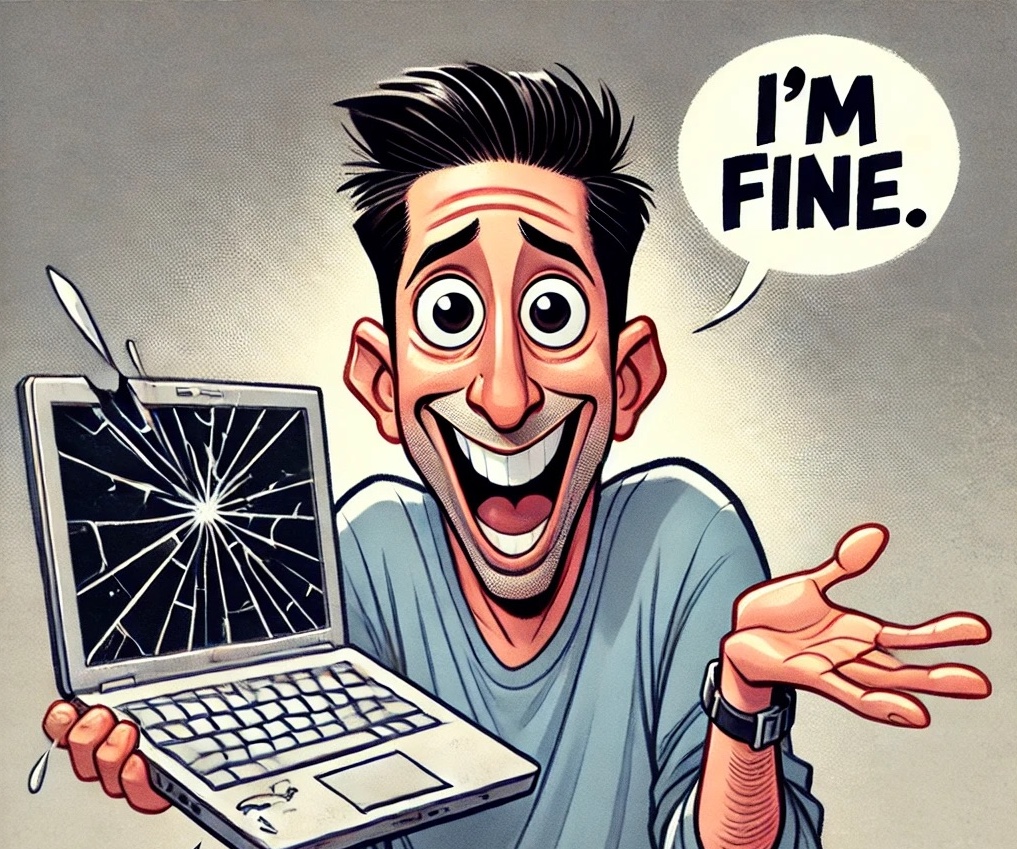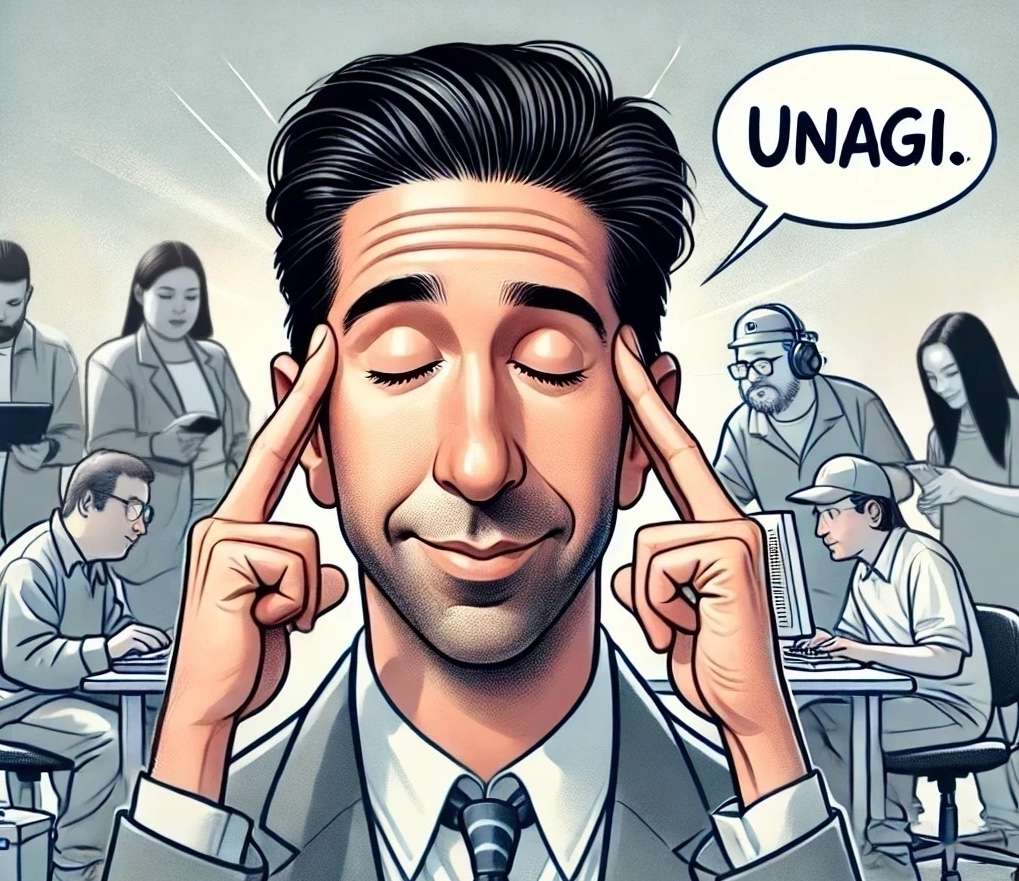
“I’m fine! Totally fine. I don’t know why it’s coming out all loud and squeaky, ’cause really………I’m fine.”
– Ross Geller (Friends, The One Where Ross is Fine)
Keeping Calm When Technology Fails: How to Manage Stress and Stay Productive
“I’m fine! Totally fine. I don’t know why it’s coming out all loud and squeaky, ’cause really, (deep voice) I’m fine.”
-Ross Geller (Friends, The One Where Ross is Fine)
As we deal with stress in life and work, sometimes all it takes is a failing piece of technology to set us on edge. Keeping calm when technology fails requires us to have strategies in place to manage stress and stay productive.
When we have a tight deadline and our login fails, over and over and over, or a file mysteriously disappears, our internet experiences an outage, sometimes all on the same day, we can feel like technology is intentionally trying to ruin our day. At any time technology can fail, leaving us in a tough spot. And due to professionalism, we try to keep it together and go around like Ross Geller saying, “I’m fine.”
Instead of pretending we’re fine, it’s important to acknowledge the stress we are under and proactively incorporate strategies and practices that can help reduce and even alleviate some of our stress or the causing factors.
According to the American Institute of Stress, a staggering 83% of U.S. workers suffer from work-related stress. Time-sensitive deadlines, client expectations, frustrating moments with co-workers, unexpected problems, and the pressure to contribute to business growth, can give stress a constant presence in your work environment—and when technology fails, it can feel like the final straw.
The Impact of Technological Failures on Stress Levels
- Time-Sensitive Deadlines: A study by the American Psychological Association revealed that 70% of workers feel that they don’t have enough time to do everything they need to do.
When Technology Fails: Time is already a finite resource, so when a technology problem takes you away from accomplishing your tasks, it adds to the pressure of racing against the clock. - Client Expectations: Clients expect timely results and want to be impressed by the quality of work.
When Technology Fails: When deadlines are missed, clients are disappointed. This not only damages your reputation but also increases stress levels as you scramble to make up for lost time and repair relationships.
Additionally, you have to switch modes from a customer service mentality over to a problem-solving mentality and from a solution-pursuing state to a state of confusion as you go from helping a customer to being helpless at solving your tech issue.
Switching modes and mental states is stressful and very exhausting. - Team Dynamics: We all love working with every single one of our co-workers. (Keep nodding). They make us feel good all the time and every one of them fills us with positive energy and joy. (Have they stopped reading over your shoulder? Ok, good. Now let’s get real…). Some co-workers can be draining. They can often take too much time talking about inconsequential information, such as, “Who should replace Hugh Jackman in the X-men movie franchise?” Coworkers can also drop the ball on projects or even have abrasive attitudes that make your day challenging.
When Technology Fails: We may give grace or patience to a fellow human, but when it comes time to use technology and it doesn’t work the way it should, we may find ourselves fresh out of patience. - Business Growth: For many small and medium-sized businesses, every task and accomplishment can be crucial to keeping the business moving forward.
When Technology Fails: The stress of not getting a task done on time could mean financial success or failure in winning a deal or losing a customer. When scaling your business is derailed or delayed due to technology failures, it can be overwhelming, leading to a vicious cycle where stress leads to more stress.
Given these challenges, managing stress effectively in the face of failing technology is essential for maintaining productivity and well-being.
5 Tips for De-Stressing When Technology Doesn’t Work
- Take a Breather: When faced with a technological glitch, the instinct might be to dive in and fix it immediately. However, taking a moment to step away can do wonders for your stress levels. Take a deep breath, get a glass of cold water or a cup of hot coffee, or take a short walk to clear your mind. This not only reduces immediate stress but can also help you approach the problem with a clearer, more focused mind. It can also be the transition exercise you need to help you switch mental modes from whatever you were doing before, into a state of problem-solving, and ready to handle detail-oriented technological steps.
- Prioritize and Delegate: If a tech issue disrupts your day, prioritize your tasks and delegate where possible. Determine how much time you need to finish the task and do some mental math to figure out how much time that leaves you to solve the technology issue. Set a clear deadline to attempt to solve the technology issue that will give you enough time to pursue plan B. Also, never underestimate your wonderful teammates who could help take on some tasks while you focus on resolving the primary issue.
- Develop a Contingency Plan: Always have a backup plan for essential tasks that rely on technology. Whether it’s an alternative communication method, a spare device, or even offline versions of critical files, having a plan B can significantly reduce stress when things go wrong. Also, be kind to yourself. When tech fails in a meeting, it could be a blessing in disguise, pushing you to connect human to human rather than through the filter/barrier of technology.
- Stay Informed: Many times, technology issues spring from a lack of understanding. Invest time in learning about the tools and systems you use regularly. Many problems can be avoided or quickly resolved with basic troubleshooting. Being informed can help you feel more in control, and confident, ready for troubleshooting, which can greatly reduce stress when something goes wrong.
- Outsource Your IT Needs: One of the most effective ways to manage stress related to technology is to rely on an outsourced technology team. A proactive IT partner not only resolves issues quickly but also works to prevent them from happening in the first place. Additionally, if you partner with the right provider, they will provide ongoing education, so you and your team understand the technology better and use it more efficiently. This proactive approach not only reduces stress but also allows you to focus on what you do best—growing your business. You can be more laser-focused instead of having to figure out how to build, grow and manage a technology and cybersecurity team on top of your main line of business. By outsourcing IT and cybersecurity to tech experts you trust, you can alleviate a load of stress for you and your team.
Stress is an inevitable part of the modern workplace, but when technology fails, it can amplify the pressure to unmanageable levels. By taking steps to manage stress and choosing a reliable IT partner, you can minimize the impact of technology issues and maintain productivity, even when things don’t go as planned. Remember, staying calm and proactive is the key to navigating these challenges successfully.
Employing these strategies will better prepare you to remain calm and prepared for the unexpected, entering into, “Unagi, a state of total awareness.”
-Ross Geller (Friends, The One with Unagi).


Nathan Caldwell
Marketing expert, thought leader, speaker, and security awareness solution creator.